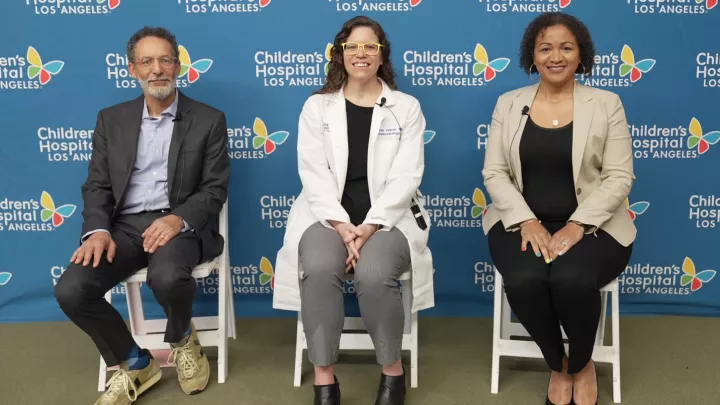
Why Is Metastatic Stomach Cancer on the Rise in Young Adults?
Three years ago, Jessica Sheth Bhutada, MD, was researching rates of metastatic cancer in adolescents and young adults (AYAs) when she noticed a disturbing trend. The incidence of metastatic stomach cancer in the U.S. was rising at a rate of 2% per year—not in older people, but in young adults.
Digging deeper, she found that more than half of young people with stomach cancer have advanced disease that’s spread to other organs at the time they are diagnosed. Hispanic and Asian young adults are 3.5 times more at risk than their white peers.

“It’s alarming because the five-year survival rate for metastatic stomach cancer is 4%. It’s abysmal,” says Dr. Sheth Bhutada, a pediatric oncologist in the Cancer and Blood Disease Institute at Children’s Hospital Los Angeles. “Considering how lethal this disease is, we should be paying more attention.”
Today, Dr. Sheth Bhutada is leading a new study aimed at uncovering the risk factors driving this increase. Earlier this year, she received the Teen Cancer America Adolescent and Young Adult Young Investigator Award to help fund her research.
“There are a number of really important disparities and questions that we need to answer,” she says. “Stomach cancer is actually declining in older adults in the U.S. So why is this happening? How is the disease different in younger people versus older people? And what can we do to prevent it or catch it at an earlier stage?”
Understanding early-onset gastric cancer
In the first part of the study, Dr. Sheth Bhutada and her team are building a retrospective cohort of patients ages 15 and older who were treated for stomach cancer at USC Norris Cancer Center and Los Angeles General Hospital.
Through extensive chart reviews, the researchers are gathering data on the clinical, biological and microbiological features of each patient’s cancer. The goal is to better characterize early-onset gastric cancer and how it may differ from stomach cancer in older adults, as well as understand how metastatic cases are different than localized ones.
One of the factors the study will explore is infection with Helicobacter pylori (H. pylori), a common bacteria that infects the stomach lining. H. pylori is prevalent in older adults with gastric cancer. However, in older adults, stomach cancer more often occurs higher up in the stomach, closer to the esophagus.
In early-onset cases—defined as those in adults younger than 50—gastric cancer tends to occur lower in the stomach, near the duodenum.
“One of the major hypotheses we are exploring is whether early-onset cases are associated with H. pylori, and if those vary depending on a patient’s racial and ethnic makeup, as well as their living environment,” Dr. Sheth Bhutada says. “Because there is evidence that these infections are more prevalent in overcrowded communities.”
Social and environmental risks
In the second half of the study, the team will look at cancer registry data from all of Los Angeles County to pinpoint any geographic “hotspots” where there are a disproportionate number of metastatic cases in young people.
The idea is to then drill down to look at the characteristics of those neighborhoods—such as walkability, quality of food, income and education levels, and proximity to health care.
“We want to see what social and environmental factors are increasing risk,” she explains. “We’ll also be comparing this heat map of cases to areas that were historically redlined, so we can start to understand the impact of structural racism as well.”
Dr. Sheth Bhutada notes that the rise in metastatic stomach cancer in young adults may in some ways mirror the recent rise in colorectal cancer. She adds that it’s important to consider factors such as diet, antibiotic exposures, stress, access to healthy food and more.
“I think as a field, we often look at high-risk molecular and biological features of a cancer and say, ‘We need targeted agents; we need new drugs,’” Dr. Sheth Bhutada says. “But social determinants of health can also have targeted interventions. We need to better understand those risks so we can very thoughtfully engage with communities to address them—and hopefully prevent more of these cases from occurring.”


